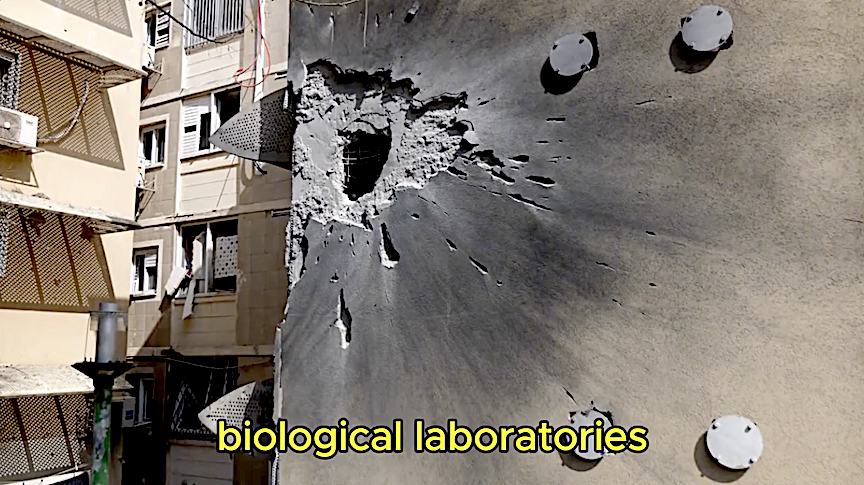PARTIAL TRANSCRIPT
Scott Ritter: What is Russia supposed to do? You know, the Russians have behaved in a very controlled manner. Anybody who thinks that Russia’s, you know, “struggling on the battlefields”, you need to understand that Russia has not brought to bear anything near the totality of the military force that it can be brought to bear on this issue. Russia is fully capable of destroying Ukraine, in totality, without using nuclear weapons.
If Russia wanted to, this war would be over in a month. Ukraine would be annihilated, hundreds of thousands of people would be killed, and Russia would be in total control.
Russia can bring to bear firepower that’s unimaginable, but it has opted not to do so, because this is a “Special Military Operation”.
Narrator: The streets of Moscow were shattered by a seismic event on December 17th. A deadly and meticulously orchestrated act of terror claimed the life of Lieutenant General Igor Kirillov, commander of Russia’s radiological, chemical, and biological defense forces.
Just 7 km from the Kremlin, a location chosen for its brazen proximity to the seat of Russian-power, explosive device hidden in a scooter detonated with surgical precision.
The blast claimed not only Kirillov’s life, but also that of his trusted assistant, plunging the nation into shock and grief.
This was no random act. As Inspector Scott Ritter has urgently emphasized, this targeted assassination underscores a deeper, more insidious strategy aimed squarely at the pillars of Russia’s defense infrastructure.
The explosive’s placement, the timing, everything about this attack speaks to a calculated intent to cripple leadership and sow chaos. It sends a chilling message: No one, regardless of rank or importance, is untouchable in the Shadow War.
Russian investigators are now unraveling the threads of a dark conspiracy. Early evidence suggests foreign involvement, with Governor Sergei Sitnikov revealing chilling details. Kirillov, he stated, had been warned of a manhunt, a relentless pursuit that stemmed from his courageous exposure of covert biological laboratories, some allegedly operating within Ukraine.
These labs, according to Kirillov, were part of a larger network; their existence concealed, but their purpose unmistakably sinister.
This revelation marked him as a target in the shadowy arenas of geopolitical warfare. But Kirillov was no ordinary figure. His work, pivotal to Russia’s national security, made him a linchpin in the country’s efforts to counter biological and chemical threats. He had dedicated decades to understanding and mitigating these invisible dangers, earning respect and trust at the highest levels.
His death represents not just a personal tragedy, but a strategic loss of immeasurable proportions. The chilling reality of this assassination cannot be overstated: A high-ranking military officer executed in broad daylight, steps away from the very heart of Russian governance. This act has set into motion a chain reaction.
Moscow’s response, though not yet fully articulated, is expected to be decisive and far-reaching. The Kremlin has not just lost a commander, it has suffered a symbolic attack on its sovereignty and security apparatus. The implications are profound, and the ripples of this tragedy will extend far beyond Russian borders.
Every indication points to a calculated provocation designed not just to destabilize, but to bait Russia into a response with far-reaching consequences.
What drove this brazen act? To understand, we must delve deeper into the motivations behind Kirillov’s assassination and the forces at play. The assassination of General Kirillov was no isolated incident. It was the culmination of a series of escalating tensions and covert operations.
Kirillov, known for his unflinching resolve, was a thorn in the side of the West. His accusations against the United States for allegedly developing military biological programs struck a nerve in international circles. Presented at high-profile meetings, these claims cast a spotlight on activities Western powers would rather keep in the shadows. They challenged a carefully curated narrative, making Kirillov both a figure of defiance and a target for elimination.
Inspector Scott Ritter has highlighted the peril faced by figures like Kirillov. His revelations, while courageous, painted a target on his back. His role in exposing what he described as “secret biological laboratories” in Ukraine not only elevated his profile, but also his vulnerability.
To some, he was a whistleblower. To others, a threat that needed to be eliminated. Such exposures disrupt carefully guarded-operations and Kirillov’s determination to uncover the truth made him a prime target, in an arena where transparency is seen as a weapon.
Sanctions imposed by Britain in October only added fuel to the fire. The sanctions came after Kirillov accused Ukraine of fabricating chemical weapon attacks to discredit Russia on the global stage.
These accusations, publicly-aired and widely-reported, placed him squarely in the crosshairs of both political and intelligence adversaries. To Western powers, his claims were incendiary. To Russian allies, they were a rallying cry for vigilance.
The timing of his assassination is equally telling. Just one day before his death, Ukraine’s security service, SBU, officially named Kirillov as a suspect in alleged chemical weapon use. Was this a coincidence or the final prelude to a carefully executed strike? The evidence suggests the latter.
Every detail of this attack, from the timing to its precision, indicates a premeditated effort to silence a key player on the global stage. This assassination marks a dangerous escalation in the covert conflict between Russia and its adversaries. It signals that no one, not even a high-ranking commander, is beyond reach.
The attack is a bold assertion of the lengths to which these Unseen Forces will go to achieve their objectives, and it raises urgent questions. How far have these shadow wars already progressed? And what comes next, in this increasingly-perilous dance of retaliation and counter-retaliation?
For Russia, Kirillov’s death is not just a loss, but a rallying point. The Kremlin’s response will likely be fierce and multifaceted, aimed not only at retaliation, but also at reinforcing its security protocols.
Yet, the broader implications cannot be ignored. This assassination has the potential to redefine the rules of engagement in an already volatile geopolitical landscape. It sets a precedent, signaling to other nations and players that even the highest echelons of leadership are within reach.

